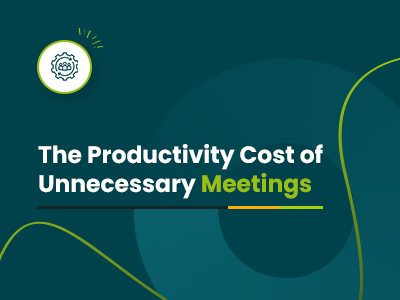Meetings are essential to collaboration, but only when they're necessary. As hybrid and remote work redefine communication norms, many companies still struggle to strike the right balance. A recent survey of over 1,000 employees uncovered just how costly unnecessary meetings can be, both in time and money. By examining meeting frequency, workplace fatigue, and ideal scheduling practices, the study offers insights every business leader should consider.
Excessive meetings are wearing down employees across roles, industries, and generations. Here's what the data reveals about who's affected and how often they meet.

Employees across industries are feeling the strain of excessive meetings. Overall, 72% reported experiencing meeting fatigue, with those in healthcare (79%) and tech (77%) expressing it the most among industries. Younger workers, especially Gen Z (81%), were the most likely to say meetings drained their energy. As for job levels and company sizes, managers (76%) and employees at large organizations (74%) also reported the highest levels of meeting fatigue.
The average employee attends five meetings per week. While millennials and Gen X aligned with this average, Gen Z typically had four meetings scheduled. A deeper dive revealed that 16% of all employees—and 17% of millennials and Gen X—participate in 10 or more meetings weekly, compared to just 11% of Gen Z.
Meeting time also adds up. On average, employees spend six hours per week in meetings, though 19% spend 10 or more hours. Among them, 22% of Gen X and 18% of millennials surpass the 10-hour mark. And while 15% of Gen Z also fell into that category, they tended to spend slightly less time overall in meetings, at five hours per week. So while Gen Z spent the least amount of time in meetings, they felt the most fatigued.
Even more concerning is the inefficiency of these meetings. Employees estimated that nearly half—46%—of their meeting time was unproductive or unnecessary. This sentiment was consistent across healthcare workers, millennials, remote employees, and those in large organizations, all of whom pegged waste at 48%. The top culprits? Status updates (53%), all-hands or town hall meetings (46%), and brainstorming sessions (29%).
The hidden cost of unproductive meetings isn't just time. There's also a significant financial drain. Here's how much businesses stand to lose.

Unnecessary meetings can hurt employee productivity and carry a steep financial cost. On average, employees estimated wasting 146 hours annually in meetings that don't add value. That lost time translated to roughly $6,280 in annual salary per employee.
Tech workers lost the most in time and money. On average, they spend 169 hours a year stuck in meetings they don't need, costing their companies about $9,825 each. For startups and growing teams, that's a clear sign it's time to rethink how meetings are handled.
Not all meeting times are ideal, either, and many employees feel obligated to attend sessions that don't serve a real purpose.

Employees are critical of not only how often but also when and why they meet. Thirty-six percent said afternoon meetings are more disruptive than those held in the morning (28%). Timing matters, and so does the day. Monday emerged as the most productive meeting day, while Friday ranked as the least.
Workplace norms also contribute to meeting inefficiency. Nearly two-thirds of employees (65%) admitted to joining meetings solely to "appear engaged," while 63% did so out of social or political expectations. These behaviors suggest that many meetings are more about optics than outcomes.
Improving how meetings are planned, attended, and conducted could offer measurable gains in employee focus and well-being.

The cultural consequences of meeting overload are becoming harder to ignore. Over a quarter of employees (26%) said they usually cancel at least one meeting per week, and for managers, that number jumps to 38%. One-on-one meetings are frequently the first to be cut, with 21% of employees noticing that this has become more common at their companies.
Virtual meeting fatigue is another issue. While 26% of employees said virtual formats are more draining than in-person ones, nearly half (49%) disagreed. Remote employees were more likely to disagree (53%) compared to their on-site peers (47%).
Silence speaks volumes, too. Surprisingly, 85% of employees have stayed quiet during meetings despite having something to say, with 21% doing so regularly. They most often did so because meetings felt performative, like those attending are more focused on putting on a show than on having real conversations.
Packed calendars are affecting more than just meeting attendance. Over half of employees said it limits their ability to focus (63%), reduces productivity (62%), and leads to feelings of burnout (59%). Employees are eager for solutions. Their top suggestions for improving meeting culture were having shorter meetings (59%), clearer meeting agendas (48%), and designated "no meeting" days (36%).
Meeting fatigue is eating up time, money, and energy. Poorly planned meetings lead to wasted hours and disengaged teams, and the costs add up fast. But it doesn't have to be the norm. Listening to what employees need and rethinking how meetings happen can turn things around. Cutting even one off the calendar can mean less burnout and more focus.
Methodology
For this study, we surveyed 1,002 employees about their workplace meeting habits, productivity costs, and potential future improvements to meeting culture. Demographically, the respondents represented as follows:
*Samples were not used as part of breakdowns.
About Software Finder
Software Finder helps business leaders find the right tools to enhance workplace efficiency and productivity. From project management to collaboration platforms, our expert guides and software comparisons help you to make decisions based on your unique business needs.
Fair Use Statement
We welcome the sharing of this information for noncommercial purposes. If you reference or republish any part of this content, please provide a link with proper attribution to SoftwareFinder.com.
